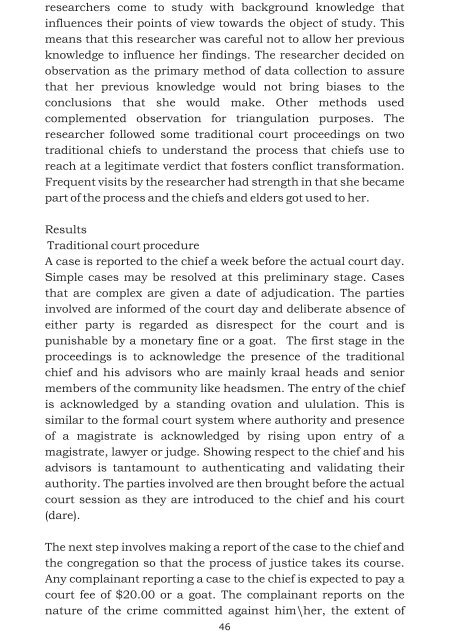Beneficiaries are actors too.pdf - Southern Institute of Peace ...
Beneficiaries are actors too.pdf - Southern Institute of Peace ...
Beneficiaries are actors too.pdf - Southern Institute of Peace ...
You also want an ePaper? Increase the reach of your titles
YUMPU automatically turns print PDFs into web optimized ePapers that Google loves.
esearchers come to study with background knowledge that<br />
influences their points <strong>of</strong> view towards the object <strong>of</strong> study. This<br />
means that this researcher was c<strong>are</strong>ful not to allow her previous<br />
knowledge to influence her findings. The researcher decided on<br />
observation as the primary method <strong>of</strong> data collection to assure<br />
that her previous knowledge would not bring biases to the<br />
conclusions that she would make. Other methods used<br />
complemented observation for triangulation purposes. The<br />
researcher followed some traditional court proceedings on two<br />
traditional chiefs to understand the process that chiefs use to<br />
reach at a legitimate verdict that fosters conflict transformation.<br />
Frequent visits by the researcher had strength in that she became<br />
part <strong>of</strong> the process and the chiefs and elders got used to her.<br />
Results<br />
Traditional court procedure<br />
A case is reported to the chief a week before the actual court day.<br />
Simple cases may be resolved at this preliminary stage. Cases<br />
that <strong>are</strong> complex <strong>are</strong> given a date <strong>of</strong> adjudication. The parties<br />
involved <strong>are</strong> informed <strong>of</strong> the court day and deliberate absence <strong>of</strong><br />
either party is regarded as disrespect for the court and is<br />
punishable by a monetary fine or a goat. The first stage in the<br />
proceedings is to acknowledge the presence <strong>of</strong> the traditional<br />
chief and his advisors who <strong>are</strong> mainly kraal heads and senior<br />
members <strong>of</strong> the community like headsmen. The entry <strong>of</strong> the chief<br />
is acknowledged by a standing ovation and ululation. This is<br />
similar to the formal court system where authority and presence<br />
<strong>of</strong> a magistrate is acknowledged by rising upon entry <strong>of</strong> a<br />
magistrate, lawyer or judge. Showing respect to the chief and his<br />
advisors is tantamount to authenticating and validating their<br />
authority. The parties involved <strong>are</strong> then brought before the actual<br />
court session as they <strong>are</strong> introduced to the chief and his court<br />
(d<strong>are</strong>).<br />
The next step involves making a report <strong>of</strong> the case to the chief and<br />
the congregation so that the process <strong>of</strong> justice takes its course.<br />
Any complainant reporting a case to the chief is expected to pay a<br />
court fee <strong>of</strong> $20.00 or a goat. The complainant reports on the<br />
nature <strong>of</strong> the crime committed against him\her, the extent <strong>of</strong><br />
46


